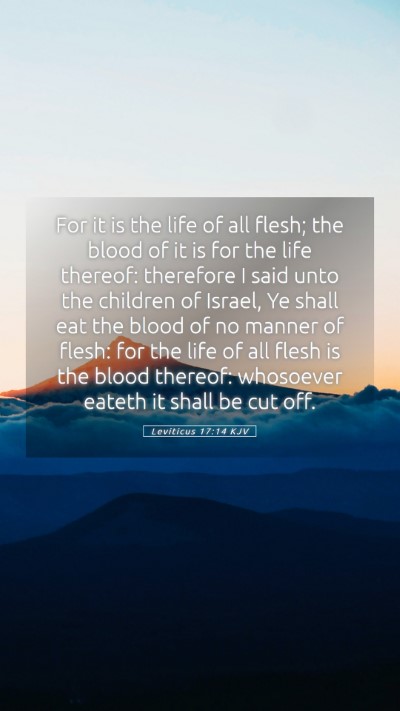Understanding Leviticus 17:14
"For it is the life of all flesh; the blood of it is for the life thereof: therefore I said unto the children of Israel, Ye shall eat the blood of no manner of flesh: for the life of all flesh is the blood thereof: whosoever eateth it shall be cut off."
Bible Verse Meanings
This verse highlights the sanctity of life as represented by blood in the biblical tradition. The prohibition against consuming blood underscores a deeper spiritual truth regarding the life force endowed by God.
Bible Verse Interpretations
Matthew Henry emphasizes that the blood symbolizes the life of an animal, which God designated for sacred purposes. Adam Clarke adds that this command served as a reminder of the covenant relationship between God and Israel, reinforcing their obligation to respect His commandments.
Bible Verse Understanding
In understanding this scripture, we recognize the ancient Hebrews’ view of blood as sacred. Barnes comments that this prohibition was not merely a dietary law but a means of instilling respect for God's provision of life. The blood was considered holy, reserved for sacrificial rites and not for common consumption.
Bible Verse Explanations
This directive forms part of the Levitical laws, whereby the blood from sacrificial animals was to be offered to God, not consumed. This illustrates God's holiness and His desire for His people to live in a way that acknowledges His dominion over life and death.
Scripture Analysis
When analyzing Leviticus 17:14, we find it essential to consider the cultural context of ancient Israel. The consumption of blood was a common practice in neighboring pagan rituals, and this law served to distinguish Israel from other nations, reinforcing their unique identity as God’s chosen people.
Biblical Exegesis
The act of cutting off anyone who disobeyed this law, as mentioned, illustrates the seriousness with which God regarded this command. The death penalty for those who ate blood symbolizes the critical nature of obedience in the covenant relationship.
Bible Study Insights
In our Bible study groups, discussing the significance of this verse offers insights into Old Testament theology and the nature of God as a life-giver. It prompts reflections on how these ancient laws point to spiritual truths relevant to us today, such as the importance of respecting life in all its forms.
Meaning of Bible Verses
This verse significantly contributes to our understanding of God's eternal moral laws. Blood, representing life, becomes a central theme not only in Leviticus but throughout the Bible, culminating in the New Testament with the sacrificial death of Christ, where His blood is the ultimate atonement for sin.
Understanding Scripture
Understanding Leviticus 17:14 in the broader narrative of Scripture allows us to appreciate the continuity of God’s plan for redemption. It teaches us that the reverence for blood foreshadows the ultimate sacrifice made by Jesus, fulfilling the law and establishing a new covenant.
Additional Cross References
- Genesis 9:4: "But you must not eat meat that has its lifeblood still in it." – Establishing the foundational principle of not consuming blood.
- Hebrews 9:22: "Without the shedding of blood, there is no forgiveness." – Explaining the requirement of blood in atonement.
- Leviticus 11:11: "They are to be regarded as detestable." – Further dietary laws emphasizing holiness.
- Deuteronomy 12:23: "Only be sure that you do not eat the blood, for the blood is the life, and you shall not eat the life with the flesh." – Reinforcing the message of Leviticus 17:14.
Application in Daily Life
Applying the lessons from Leviticus 17:14, we are reminded of the importance of reverence toward God’s creation and the sanctity of life. This understanding challenges us to respect not only animal life but also our moral and spiritual responsibilities before God.
Conclusion
Leviticus 17:14 serves as a critical reminder within biblical scholarship for understanding the significance of blood in the covenant community of Israel. Through this, believers today can gain insights into God's unchanging nature and His expectations for holiness.


